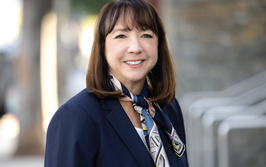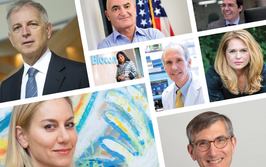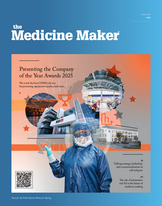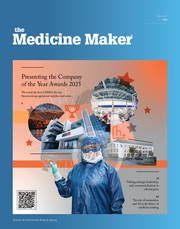Singular Head of Generics
Sitting Down With… Nick Haggar, Head of Western Europe, Middle East & Africa, Sandoz, and President of the European Generic Medicines Association (EGA).
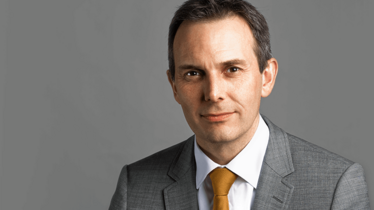
How did you get into the pharmaceutical industry?
My father suffered with cardiovascular disease and diabetes for most of his life; as a child, I remember being determined to do something that helped people like him get well. The difference that the right medicine can make to people’s lives is one of the things that continues to inspire and motivate me, even now. I started my career working in technical roles, first at Baxter Healthcare, then at GlaxoSmithKline. While at GlaxoSmithKline, I decided to make the move to the commercial side of the business, and I have been in commercial roles ever since.
What motivated your switch to a commercial role?
The main motivator was the opportunity to be entrepreneurial, to drive growth and to compete; my current role as Head, Western Europe, Middle East & Africa at Sandoz certainly gives me that opportunity, but also taps into my technical knowledge of the supply chain. I absolutely love what I do and consider myself to be in a very privileged position to work for one of the strongest companies in the generics space.
How has the generics market evolved in recent years?
The industry has grown significantly over the last decade. In Europe today, 55 percent of all prescriptions are for a generic medicine. In another 10 years, I expect that to have risen to 75-80 percent. The generics industry is now central to public health in Europe, which is a tremendous transformation but also a tremendous responsibility. The growth and diversification of the industry is driving a change in the way generics are perceived – there is increasing recognition that all medicines, whether generic or branded, are far too important to be considered purely as commodities.
What is the key challenge right now?
After the rapid growth of the past decade, the last few years have been a time of significant reflection for leaders in the industry, including here at the EGA. One of the biggest challenges to creating a sustainable industry – and sustainable access to medicines – is the perception of value. There is a perception that medicines are expensive. But I would ask: compared with what? The generics industry saves European payers around €40 billion per year. As an example, across Europe, we supply medications to control Type 2 diabetes at an average of €0.25-0.30 per day, wholesale. When meeting with payers and regulators, we often discuss the fact that the coffee we just shared costs the same as three months of diabetes treatment. Payers face an ever-increasing demand for medicines and subsequent pressure on their cost base. But continual, year-on-year price cuts that go beyond the efficiency gains a highly regulated industry can expect to achieve are just not sustainable.
What is the EGA’s approach?
We believe there is a more profound discussion to be had about medicines – not as a cost, but as an investment in the health of Europeans. We want to partner with governments so that we can be seen as part of the solution, not a procurement target – and that means looking at the healthcare industry from different points of view and trying to find common ground. Since adopting this multi-stakeholder approach, our dialogue with payers, patient associations, pharmacy associations and others is already much more positive and dynamic. We believe that, if there is willingness to make compromises on all sides, we will achieve a better outcome for patients.
What else do you hope to accomplish as EGA President?
There is a huge amount of work to do in the coming years. The first priority is to work in partnership with stakeholders around Europe on implementation of the falsified medicines directive. Second, we intend to put in place a new code of conduct for the industry. The global pharmaceutical industry’s reputation has suffered in recent years and at the EGA we want all our members to commit to a stronger, clearer code of conduct. The industry must do more to re-establish its reputation and communicate the importance of its role in society.
You’re clearly passionate about your work – what is your proudest achievement?
I feel proud of the difference we are making to access – especially in Africa. I spend a lot of time in Africa and have seen first-hand what it means when effective medicines are not available. Opening up access to medicine is something Sandoz takes seriously. One example is our work with UNICEF and the UN on pediatric amoxicillin. A few years ago, they identified a need for a pediatric formulation of amoxicillin to fight childhood pneumonia, and we worked with them to develop a low-strength, dispersible form of the drug. The first shipment of the drug will go to UNICEF any day now, and we’re working hard to scale that up. Pneumonia kills around 900,000 children worldwide every year so if we can get the drug to those who need it, it could have a significant impact on child mortality. More broadly, I’m proud to have been part of an industry that has brought effective medicines to so many people around the world. The pharma industry has been instrumental in turning HIV from a death sentence to a chronic disease, developing breakthrough treatments for malaria, and improving quality of life for millions of people with respiratory disease.

As an Editor at Texere, I’m working closely with our audience to create vibrant, engaging content that reflects the hard work and passion that goes into bringing new medicines to market. I got my start in biomedical publishing as a commissioning editor for healthcare journals and have spent my career covering everything from early-stage research to clinical medicine, so I know my way around. And I can’t think of a more interesting, challenging or important area to be working in.



